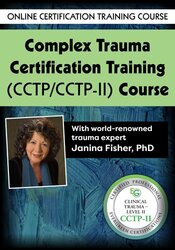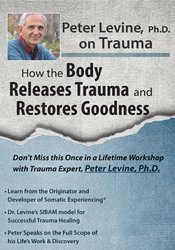Description
International trauma expert and author, Peter A. Levine, Ph.D. will teach you how sensation-based treatment (as opposed to emotional or rational-based treatment) can be effective for trauma treatment. He discusses the important principles in successful trauma treatment, and uses his own successful renegotiation of a personal traumatic event as an example.
Representing the full scope of his life’s work, Dr. Levine discusses the evolutionary underpinnings of trauma. This recording includes an in-depth review of how trauma is related to the ethnological concept of tonic immobility, as well as the roadmap of the Polyvagal system – a fascinating neurophysiological model for understanding how we shift between the states of fight-or-flight, shutdown, and social engagement. Dr. Levine provides simple containment tools to help you develop your awareness of these state changes in order to more effectively engage your client in trauma therapy.
CPD
CPD
This online program is worth 4.75 hours CPD.
Speaker
Peter A. Levine, PhD, holds doctorates in both medical biophysics and psychology. The developer of Somatic Experiencing®, a body-awareness approach to healing trauma, and founder of the Somatic Experiencing Trauma Institute, which conducts trainings in this work throughout the world and in various indigenous cultures, with 26 faculty members and over five thousand students. Dr. Levine was a stress consultant for NASA on the development of the space shuttle project and was a member of the Institute of World Affairs Task Force of Psychologists for Social Responsibility in developing responses to large-scale disasters and ethnopolitical warfare. Levine’s international best seller, Waking the Tiger: Healing Trauma, has been translated into 22 languages. His recent interests include the prevention of trauma in children, and he has co-written two books, with Maggie Kline, in the area: Trauma Through a Child’s Eyes and Trauma-Proofing Your Kids. His most recent book: Trauma and Memory: Brain and Body in a Search for the Living Past, was recently released to rave reviews. Levine’s original contribution to the field of body psychotherapy was honored in 2010 when he received the Lifetime Achievement Award from the United States Association for Body Psychotherapy (USABP). Levine was also honored as the recipient of the 2020 Psychotherapy Networker Lifetime Achievement Award.
Speaker Disclosures:
Financial: Dr. Peter Levine is the founder and president of the Ergos Institute of Somatic Education, the president and editorial director of Ergos Institute Press, and receives a consulting fee from the Meadows Addiction Center. He receives royalties as a published author. Dr. Levine receives a speaking honorarium, recording, and book royalties from Psychotherapy Networker and PESI, Inc. He has no relevant financial relationships with ineligible organizations.
Non-financial: Dr. Peter Levine is a senior clinical fellow and advisor to the Meadows Addiction Treatment Center. He is a member of the American Psychological Association, the Humanistic Psychological Association, and the International Society for Traumatic Stress Studies.
Objectives
- Articulate the four major developmental stages that increase vulnerability to trauma and how to recognize them in your clients.
- Determine the naturalistic mechanics of trauma and survival responses of flight, fight, freeze and collapse as it relates to clinical treatment.
- Discover the evolutionary underpinnings of trauma and the Polyvagal theory and their clinical implications.
- Demonstrate the importance of “Bottom-up” processing versus “Top Down” processing to improve treatment outcomes.
- Summarize the process of how overwhelming stress leads to somatic and emotional syndromes in clients.
- Incorporate Dr. Levine’s simple containment tools in order to more effectively engage your client in trauma therapy.
Outline
Child Development: The Signs of Trauma in Each Developmental Period:
- Pre-Natal
- Hormonal interactions between mother and child
- Birth Stress
- Year One
- Safety, affection and containment
- Proprioceptive development
- The Dopamine System
- The space to explore one’s effect on the world
- The formation of a self that is different from Mom and Dad
- Testing boundaries
- Age 3-5
- The Biology and balance of shame
- The importance of shame in society
- The signs of overshaming
- The signs of undershaming
- The initial forays into sexuality
- The importance of flirting
- How these sames stages replay themselves out in later life
The Naturalistic Mechanisms of Trauma
- Understanding our primary survival tactics and how they play out in the body: Flight, fight, freeze and collapse
- 500 million years of evolution: Our Polyvagal underpinnings
- How the Dorsal Vagal System is related to shutdown and collapse
- Fight or flight: Sympathetic/adrenal System mobilization, Returning to our Mammalian birthright: The Ventral vagal system and social engagement
- How we get “stuck”
- Tonic immobility – The fallback to freeze
- Freeze couples with Fear
- Dissociation
- Bracing and terror
- Euphoric dissociation
- Collapse
- Somatic and emotional – syndromes and complexes
- Emotional – anxiety, depression
- Somatic – chronic pain, fibromyalgia
- Autonomic – migraines, irritable bowel
Resolving Traumatic Reactions
- The importance of “Bottom-Up” processing
- The Paul MacLean’s Triune Brain
- In an Unspoken Voice
- Somatic Experiencing©
- Renegotiation vs. Reliving
- Restoration of self-regulation
- Trauma isn’t about the event, but the body’s inability to process and integrate the nervous system charge
- The importance of developing a felt sense
- The nine basic stages of trauma treatment
- Containment of strong sensation and emotion
- Pendulation – The dual opposites of sensation
- Titration – going gradually
- Completion
- Renegotiation of active for passive responses
- Simple exercises that you can use in your practice
Spirituality and Trauma
- Trauma as one of the 4 avenues to enlightment
- Lessons from the Kundalini
- A feeling of “okayness”, wholeness and trust in the world
- And other side effects of effective trauma treatment
- The importance of maintaining balance in one’s life
Target Audience
Counselors, Social Workers, Psychologists Psychotherapists, Therapists, Marriage and Family Therapists, Addiction Counselors, Occupational Therapists, Occupational Therapy Assistants, Case Managers, Nurses, School Psychologists, Other Helping Professional
Reviews
Overall:
4.1
Total Reviews: 32
















